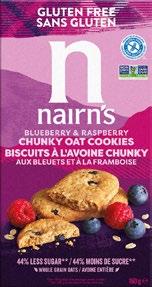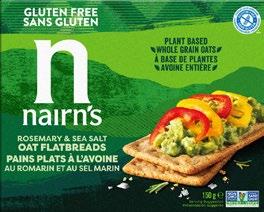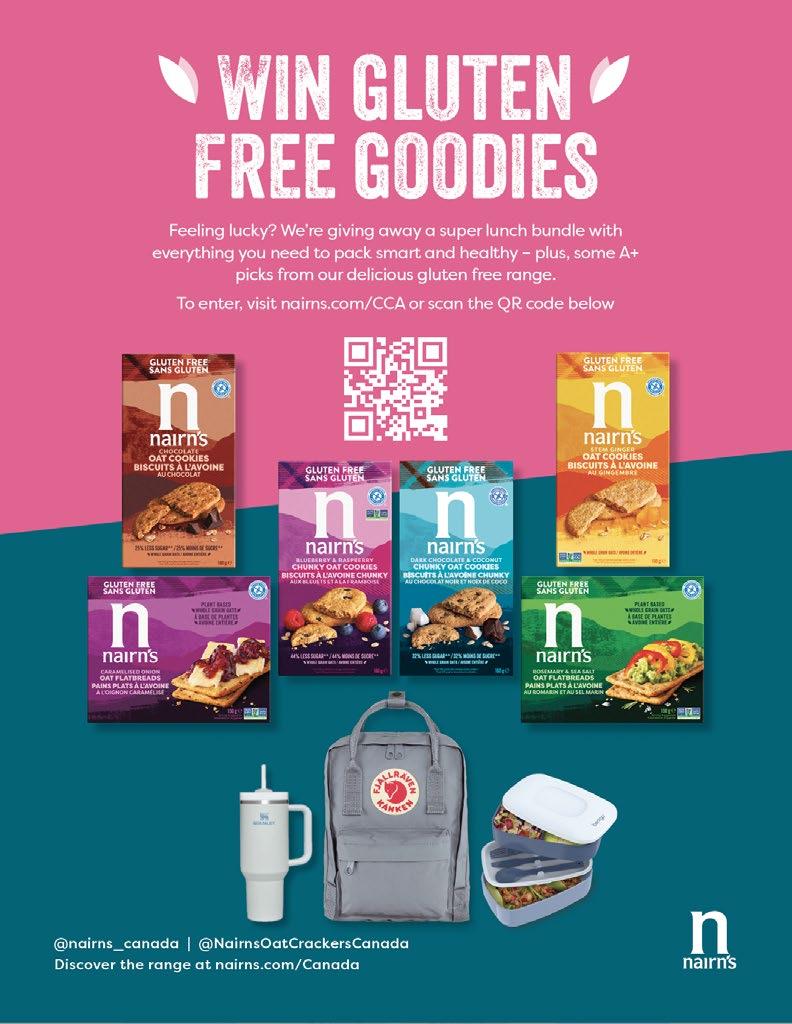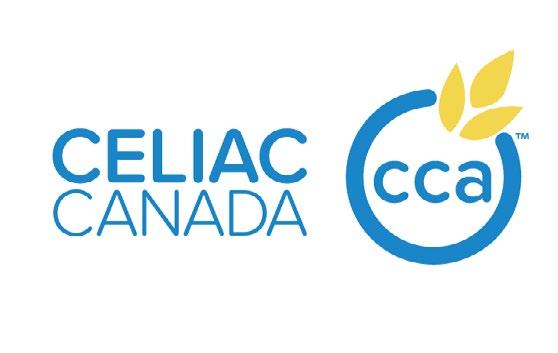CELIACCANADA Ready for post-secondary



Gluten free wholegrain oats 40% less sugar Baked in Scotland Certified Gluten Free
We believe a restricted diet shouldn’t mean missing out. There’s plenty of fun to be had. That’s why our gluten free range is full of flavour, with perfect picks for any packed lunch.
Win 1
If you’re new to packing lunches or fancy a refresher, these little wins make all the difference…

You’ll want a lunchbox with a balance of fun and practical. Lots of small compartments
Win 3
Win 2
Don’t forget leftovers
If you’re cooking a gluten free favourite for dinner, why not make sure there’s an extra portion for tomorrow’s lunch?
Rotate your fillings
Avoid lunchtime boredom by mixing things up. Whether it’s sandwiches, roll-ups or pasta, try and switch your added ingredients up regularly.

Win 5
Win 4



For increased fruit intake, smoothies are an easy option. Freeze them overnight and they’ll also keep everything fresh.
For a tasty trick up your sleeve, try Nairn’s Gluten Free Cookies. Baked with Scottish wholegrain oats, our Raisin or Chocolate Oat Cookies make the perfect ingredient for any packed lunch. Or, for something different – our Apple & Cinnamon or Blueberry & Raspberry Chunky Oat Cookies have even more oaty flavour.



I’VE BEEN ACCEPTED. NOW, WHAT ARE MY OPTIONS? 6
z What to ask…
LIVING WITH ROOMMATES 10
z Cross contamination
z Shared accommodations
z What to do when you get glutened
z Dining out
z Parties + alcohol


ADDITIONAL RESOURCES 18
z Learn how to read a label – 3 easy steps
z Back to school recipes
z Eating gluten-free on a budget
z Support: FB group, CCA website, support line



University is a busy time. So, how do you juggle your studies with maintaining a healthy gluten free lifestyle? Here are a few ways that you can make gluten free living effortless and full of goodness.

Know your surroundings
If you’re studying in a new area, ask around or research your local gluten free café and restaurant options.
inspired
Stock up on essentials
Make sure you always have gluten free staples to hand, like gluten free pasta and rice.
The gluten free diet is much less restricted these days and there’s plenty of recipe ideas in cookbooks and online. Experiment in the kitchen, you may find a new hobby.

Speak up
Whether you’re out for a meal, eating at the cafeteria or at a party, don’t be afraid to ask about ingredients.


Have a few simple options with fresh ingredients that you can throw together in a few minutes. This way you can reach for them instead of the more convenient alternatives. Nairn’s Gluten Free Flatbreads give you lots of space to experiment with toppings. These aren’t your average snack bases either – they’re packed with flavour.

... having celiac disease at university or college doesn’t have to hold you back. With proper planning and preparation, you can enjoy a stress-free and fulfilling experience
Entering post-secondary school as a young adult is an exciting transition, but it often comes with its own set of fears and anxieties. For those with celiac disease, managing a gluten-free diet can be a significant concern.
As you move away from home, you can no longer rely on your parents to ensure all your food is gluten free. You’ll need to be more vigilant and self-reliant in making decisions about your diet while maintaining your health. However, having celiac disease at university or college doesn’t have to hold you back. With proper planning and preparation, you can enjoy a stress-free and fulfilling experience.
This guidebook provides tips and strategies to help you navigate your gluten-free journey and make the most of your years at post-secondary.
If you are newly diagnosed with celiac disease, we have many resources to support your new lifestyle. Join our Newly Diagnosed Pathway program and receive a kit of information along with curated emails filled with resources and easy to digest information. We also have a help desk - email or call us and regular Gluten Free 101 webinars and they are all FREE!
You got this and we are here for you!
Caleigh McAulay, MAN RD Health Promotion & Research Manager
University of Prince Edward Island and University of Guelph Graduate

Some institutions offer gluten-free options, while others may not. It’s time to do some investigating.
Start by:
z Google searching Look up the university or college’s website to find information about their meal plans and dining hall options.
z Reach out directly Reach out to the dining services or admissions staff to inquire whether they can accommodate a gluten-free diet for someone with celiac disease. Food service staff are often familiar with the needs of individuals with celiac disease and can help you establish a personalized plan.
z Meal plan options If you are required to be on a meal plan but there are limited GF options, ask about a discount as you will likely need to purchase additional food outside of the plan, unlike other students. Continued on next page
Each university is different, so asking detailed questions will help ensure you feel safe and comfortable

z Ask key questions Inquire about how they prepare gluten-free foods, whether they use dedicated equipment (like fryers), and their procedures to prevent cross-contamination.
z Be proactive Each university is different, so asking detailed questions will help ensure you feel safe and comfortable. Remember, it’s your right to inquire about your safety and well-being, so be confident in seeking the information you need.
z Visit the campus During your visit, evaluate the available supports and resources. Take the opportunity to tour the dining halls and dorm rooms to assess gluten-free options.
Look before you commit! If you are still reviewing your post-secondary application options, visit multiple universities, you can compare the availability and quality of gluten-free options. This will help you choose the university that best meets your dietary needs and personal preferences.
1. What precautions are in place to safely serve students with celiac disease who require a strict gluten-free diet?
2. Are the staff knowledgeable about glutenfree diets and celiac disease?
3. What protocols are in place to prevent cross-contamination?
4. How does the kitchen ensure that glutenfree food is cooked safely?
5. Does the kitchen have a dedicated space for preparing gluten-free foods?
6. Are there dedicated fryers for gluten-free items?
7. Can you access the menu and ingredient information to ensure food safety?
8. Are there any certified gluten-free options available?
9. Are gluten-free meals clearly labeled? If the school cannot accommodate your dietary restrictions, ask if you have the option to opt out of the meal plan.
1. What housing options are available for individuals with celiac disease?
2. Which dorm styles allow for microwaves and fridges in the room?
3. What accommodations are available for safely cooking and storing your food?
4. If the dining hall cannot provide a glutenfree plan, is there a dorm style with a shared kitchen or kitchenette available? u

If you encounter difficulties meeting your needs, there are steps you can take. Access to safe food is a human right.
z Define the issue. Put your issues in clear terms in writing and document specific incidents to offer examples.
z Review school policies around filing complaints including human rights violations, failing to accommodate, etc.
z Get a meeting. A mediation process can identify solutions to accommodate your unmet needs or where service was not provided (eg. discounts, rebates on meal plans, food storage and allowing self-prepared meals in facility kitchen). There are a number of school officials to whom you can self-advocate: internal ombudsmen, Continued on next page
Contact Celiac Canada. As a patient advocacy charity, we can help provide some materials to give to the institution ...
Dean’s office, Student Services, Student Grievances office or the department in charge of accessibility and accommodations. They are usually supportive and can assist in ensuring you receive the necessary accommodations.
z Contact Celiac Canada. As a patient advocacy charity, we can help provide some materials to give to the institution or offer a letter to help confirm your dietary needs of your disease.
z Taking it to the next level. If your issues remain unresolved, the next option is making an official complaint to the provincial level.
– Ombudsman One option is with an independent provincial ombudsman who oversees complaints of universities, colleges and training institutions. They will want to see what steps you have already tried to resolve the issues. They can often offer direction or advice to help with the process, it’s confidential and free of charge.
– Human Rights If want to know if your human rights have been violated contact your provincial Human Rights Legal Support Centre . University and Colleges are funded provincially. These agencies are there to protect from discrimination in areas such as restaurants, stores, schools, and housing. A human rights action will take a long time. Call Celiac Canada if this is a direction you wish to take. Here is a list of provincial human rights agencies
In a recent survey conducted by Celiac Canada, students shared their experiences with gluten-free accommodations at various universities. The top university that excelled in meeting students’ gluten-free needs was:
This institution was recognized for their effective strategies and support systems for students with celiac disease, ensuring a more inclusive and accommodating environment. u
Get a meeting.
A mediation process can identify solutions to accommodate your unmet needs or where service was not provided (eg. discounts, rebates on meal plans, food storage and allowing self-prepared meals in facility kitchen)

Whether you’re living on or off campus, it’s likely that you’ll have roommates at some point. Ideally, you might find roommates who are also gluten free, but this is often not the case. Regardless of their dietary preferences, clear and open communication with your roommates is crucial. Inform them about celiac disease, the risks associated with gluten exposure, and the specific needs you have to stay safe. When your roommates understand the potential severity of gluten-related issues, they are more likely to be supportive and accommodating of your dietary requirements. Continued on next page
When your roommates understand the potential severity of glutenrelated issues, they are more likely to be supportive ...
CROSS CONTAMINATION PREVENTION
Cross contamination is a major concern for students living in shared accommodations. To minimize the risk and maintain a safe gluten-free environment, consider these tips:
z Designate a gluten-free space Have a dedicated cupboard or drawer for your gluten-free items.
z Label your foods Clearly label all your gluten-free foods to avoid confusion.

z Use separate equipment Invest in a separate toaster or use toaster bags specifically for gluten-free items.
z Keep condiments separate Have your own condiments and make sure to label them.
z Ensure clean cookware Verify that all pots and pans are thoroughly cleaned before use.
z Wipe down surfaces Regularly clean all surfaces to prevent cross-contamination.
TIPS FOR IF YOU GET GLUTENED: BECAUSE MISTAKES HAPPEN!
Even with careful planning, accidental gluten exposure can occur. If you find yourself in this situation, here are some steps to help you manage:
z Be kind to yourself Remember that mistakes happen. Be gentle and patient with yourself as you recover.
z Rest Allow your body time to heal by getting plenty of rest.
z Hydrate Drink plenty of fluids to stay hydrated.
z Use a heating pad Apply a heating pad to ease abdominal discomfort.
z Sip on tea Herbal teas, such as peppermint or ginger, can help soothe your stomach.

For additional information: Cross ContaminationCeliac Canada


z Stick to simple foods Eat bland, easily digestible foods like rice, applesauce, and bananas to avoid further irritation.
z Tell a trusted person Let someone you trust know what happened, so they can offer support and help if needed. u


Social events, especially those involving food, can be particularly challenging for people with celiac disease. The uncertainty of whether gluten-free options will be available can be stressful. To ease your anxiety and ensure you have a positive experience, consider these tips:
z Pack gluten-free snacks Bring a selection of your favorite gluten-free snacks to have on hand
in case there are no suitable options available.
z Eat before you go Have a meal before attending the event to reduce the likelihood of feeling hungry and anxious about the food situation.
z Bring your own dish If possible, prepare and bring a gluten-free dish to share with others.
Continued on next page
Dining out should be an enjoyable experience for everyone, but for individuals with celiac disease, it often comes with significant challenges
Dining out should be an enjoyable experience for everyone, but for individuals with celiac disease, it often comes with significant challenges. The need to strictly avoid gluten, coupled with the potential for cross-contamination, can make eating out a difficult task. Here are some tips to help make dining out safer and more enjoyable:
z Research Ahead
Use online resources and apps to find restaurants with gluten-free menus or good reviews from the celiac community. Join relevant online groups, such as our Celiac Canada Peer Support Facebook group, to ask members for their favorite dining locations.
z Call the Restaurant
Contact the restaurant in advance to discuss your dietary needs. Ask specific questions about their gluten-free menu options and food preparation practices to ensure they can safely accommodate you.
z Ask Detailed Questions
When you arrive at the restaurant, ask detailed ques-
tions about how your food will be prepared. Confirm that the staff understands the importance of avoiding cross-contamination.
z Backup Plan: Carry Your Own Snacks
If you’re unsure about the restaurant’s ability to provide a safe meal, bring your own gluten-free snack. This ensures you have something to eat if you find the restaurant’s options unsatisfactory.
z Keep a List of GF Restaurants
Over time, you’ll learn which restaurants you can safely eat at or at least the ones where you feel most comfortable. Keep a list on your phone so when your friends ask where to go, you always have options.
By researching ahead, asking detailed questions, and taking proactive steps, you can navigate the challenges, reduce the risk of gluten exposure, and enjoy meals at restaurants safely. More information on dining out safety
Continued on next page

University life often comes with events involving alcohol, and having celiac disease doesn’t mean you need to miss out ...

University life often comes with events involving alcohol, and having celiac disease doesn’t mean you need to miss out. While avoiding gluten in food is well-known, it’s also important to be aware of gluten in alcoholic beverages. These tips will help you make informed choices and enjoy social occasions without compromising your health.
z Gluten-Free Beer The growing demand for gluten-free options has led to the creation of beers made from ingredients like sorghum, rice, millet, and corn. These beers undergo rigorous testing to ensure they contain less than 20 parts per million (ppm) of gluten, the threshold for labeling a product as gluten-free. Note: gluten-reduced or gluten-removed beers are NOT safe choices for someone with celiac disease.
z Wine Wine, including red, white, and sparkling varieties, is naturally gluten-free and safe for those with celiac disease. However, be cautious of wine coolers, flavoured wines, and wine-based cocktails, as they may contain added ingredients that could
contain gluten. Always read the ingredient list.
z Cider Hard cider made from apples or other gluten-free fruits is a safe option for individuals with celiac disease. Just be sure to check the label.
z Distilled Spirits Distilled spirits such as vodka, gin, rum, tequila, and brandy are considered safe for those with celiac disease, as the distillation process removes gluten proteins – yes, even rye whiskey. However, flavoured spirits and pre-mixed cocktails may contain added ingredients that could contain gluten, so it’s essential to check labels and ingredient lists.By understanding which alcoholic beverages are safe and taking proactive steps to ensure your choices are gluten-free, you can savour your favorite drinks without compromising your health. Remember to always read labels, do your research, and advo-

This checklist will help ensure you have everything you need for a successful and comfortable university experience, especially when it comes to maintaining a gluten-free lifestyle:
z Toaster
z Toaster Bags
z Gluten-Free Labels
z Food Containers
z Utensils
z Cutting Board
z Pots and Pans
z Kitchen Towels / rags
z Air Fryer
z Slow Cooker
z Lunch Box
z Backpack u










By following these tips, you can navigate university life more smoothly and enjoy your time there while managing your gluten-free diet
z Do your research Find the right university for you. Some universities offer gluten-free options, but not all do. Call around, talk to the dining staff, and ask if they can accommodate a gluten-free diet for someone with celiac disease.
z Keep gluten-free snacks handy You never know when you might end up in a situation where reliable gluten-free food isn’t easily accessible (e.g., in a lecture hall).
z Buy a mini fridge This is helpful for storing food in your dorm room or apartment for late nights when nothing else is open.
Continued on next page
Eat naturally gluten-free foods for cost savings. Shop the perimeter of the grocery store to save money and make your meals at home

z Stock up on gluten-free freezer-friendly meals and snacks Have something easy and delicious to grab before class or onthe-go.
z Find gluten-free substitutes you love Just because you’re gluten-free doesn’t mean your food has to be boring! Eat food you genuinely enjoy.
z Eat naturally gluten-free foods for cost savings Shop the perimeter of the grocery store to save money and make your meals at home.
z Get cooking (if you can) If you have a kitchen in your residence, gather some tried and true recipes
Manage a shared kitchen. Have your own toaster, a dedicated space for your gluten-free foods, carefully label gluten-free items, and keep the kitchen clean and free from crumbs
from home, cookbooks, online community or recipe sites before you leave home. Practice making
them at home before you go if you are new to cooking. You just might become a food connoisseur or discover a new talent!
z Manage a shared kitchen Have your own toaster, a dedicated space for your gluten-free foods, carefully label gluten-free items, and keep the kitchen clean and free from crumbs. See our ‘shared kitchen’ webinar.
z Don’t avoid social events Just because they involve food doesn’t mean you have to miss out. You can eat before you go and join for drinks or bring your favorite gluten-free dish to share with everyone! Continued on next page
Surround yourself with supportive people. Those who care will try to understand ... so you never feel left out or isolated

z Educate your friends about celiac disease Many people have misconceptions about being gluten-free, so take this opportunity to educate and clear up any myths.
z Surround yourself with supportive people Those who care will try to understand and make accommodations, so you never feel left out or isolated.
z Find a support group Join the CCA Celiac Facebook Page and Peer Support Group, use the CCA Client Support Desk phone or email, and explore CCA resources such as webinars on shared kitchens, dining out, and being newly diagnosed. u
These resources will help you manage your gluten-free lifestyle effectively, especially as you transition to university life
z Learn how to read a label
z Back to school GF recipes



z Budget Tips - Celiac Canada
z Connect with us: Community - Local Groups
z Join our Facebook support group u

